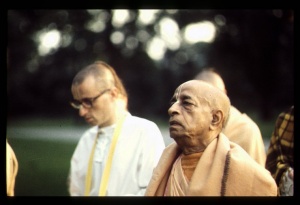SB 11.19.10

A.C. Bhaktivedanta Swami Prabhupada
Please note: The synonyms, translation and purport of this verse were composed by disciples of Śrīla Prabhupāda
TEXT 10
- daṣṭaṁ janaṁ sampatitaṁ bile 'smin
- kālāhinā kṣudra-sukhoru-tarṣam
- samuddharainaṁ kṛpayāpavargyair
- vacobhir āsiñca mahānubhāva
SYNONYMS
daṣṭam — bitten; janam — the person; sampatitam — hopelessly fallen; bile — in the dark hole; asmin — this; kāla — of time; ahinā — by the serpent; kṣudra — insignificant; sukha — having happiness; uru — and tremendous; tarṣam — hankering; samuddhara — please uplift; enam — this person; kṛpayā — by Your causeless mercy; āpavargyaiḥ — that awaken one to liberation; vacobhiḥ — by Your words; āsiñca — please pour; mahā-anubhāva — O mighty Lord.
Translation and purport composed by disciples of Śrīla Prabhupāda
TRANSLATION
O almighty Lord, please be merciful and uplift this hopeless living entity who has fallen into the dark hole of material existence, where the snake of time has bitten him. In spite of such abominable conditions, this poor living entity has tremendous desire to relish the most insignificant material happiness. Please save me, my Lord, by pouring down the nectar of Your instructions, which awaken one to spiritual freedom.
PURPORT
Material life, so much cherished by the nondevotees, is here compared to a dark hole filled with poisonous snakes. In material life there is certainly no clear understanding of one's ultimate identity, of God or of the universe. Everything is vague and dark. In material life the poisonous snake of time is always threatening, and at any moment our near and dear ones will be killed by the mortal fangs of the serpent. Ultimately, we ourselves will also be bitten and killed by the poisonous effects of time. The word sampatitam indicates that the falldown of the living entity is complete. In other words, he cannot get up again. Śrī Uddhava therefore appeals to the Lord to be kind to these poor fallen souls, humbly represented by his own self. If one receives the Lord's mercy, then even without any further qualification one can go back home, back to Godhead; and without the mercy of Lord Kṛṣṇa, the most learned, austere, powerful, wealthy or beautiful man will be pathetically crushed by the material world's machinery of illusion. The Supreme Personality of Godhead, as described here, is mahānubhāva, or the greatest, most powerful and most merciful personality, whose influence extends everywhere. The Lord's mercy is manifest in the form of His nectarean instructions such as Bhagavad-gītā and the Uddhava-gītā, being spoken here. The word kṣudra-sukhoru-tarṣam reveals the irony of material existence. Although material happiness is kṣudra, or ridiculous and insignificant, our desire to enjoy it is uru, tremendous. Our disproportionate hankering to enjoy dead matter is certainly an illusory state of mind, and it gives us constant distress, keeping us bound up in the dark hole of material existence. Every living entity should put aside his false prestige based on ephemeral bodily qualifications and appeal sincerely to the Supreme Lord, Kṛṣṇa, for His mercy. The Lord hears every sincere appeal, from even the most fallen soul, and the effects of the Lord's mercy are wonderful. Although jñānīs, yogīs and fruitive workers are laboriously endeavoring to achieve their respective goals, their position is precarious and uncertain. Simply by achieving the mercy of Lord Kṛṣṇa, however, one can very easily attain the highest perfection of life. If even one who is not a great or pure devotee of Lord Kṛṣṇa sincerely appeals to the Lord for His mercy, the Lord is sure to give it generously.